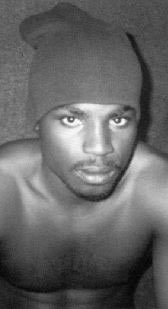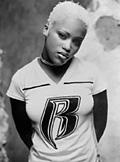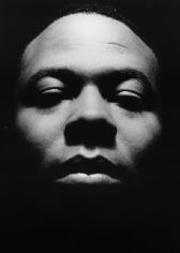No one truly knew Aaliyah Dana Houghton. Just 22 years old, she’d already lived a life most veteran entertainers would envy, but such extreme public exposure at such a young age naturally made her a reclusive figure. When I interviewed her this spring, it was a brief, platitudinous conversation. She was friendly (we should all have the pleasure of answering the phone and hearing “This is Aaliyah” coming from the other end) and forthcoming, but Aaliyah made it clear—her life belonged to no one but herself.
And could you blame her? Aaliyah was a teen star, thanks to the success of her 1994 album Age Ain’t Nothing But a Number. Decked out in baggy clothes and a ski cap, she was a truly bad creation, mixing street appeal with obvious professional training to compelling effect. Her songs were written and produced largely by R. Kelly, who’d made a name for himself as something of a musical provocateur. That image was only enhanced by the rumors of his marriage to the young Aaliyah.
Needless to say, such attention put Aaliyah on the defensive from a very young age. By the time of 1996’s follow-up album, One in a Million, she’d wiped her professional slate clean of Kelly, partnering instead, musically, with soon-to-be-superproducer Timbaland. Her storied inaccessibility began during this time period as well. Though her songs were littered with narratives of betrayal and hurt, Aaliyah pled the Fifth. After all, she never penned her own material. “I don’t know if I’ll ever really write a song,” she told me. “I try to pull from my own experiences in my life to put the passion and feeling in my music, but I can’t say that anything comes from a personal experience.”
Nevertheless, Aaliyah’s torch songs struck resonant notes with audiences of all stripes. Her songs were unmistakably urban, but slid into pop radio with their silky melodies and shimmying rhythms. Moreover, Aaliyah made a great pop star—stunningly beautiful, poised, and capable of juggling several projects at once. Earlier this year, she flew her entire production team to Australia so she could complete her most recent album (the self-titled Aaliyah, released in July) while filming her part in the adaptation of Anne Rice’s The Queen of the Damned.
When I asked her about her precocity, she was typically humble, yet confident: “I’ve never really had that much of a problem with getting respect. I’ve always been blessed to have just that. It’s how you carry yourself. I’ve always been a very mature person, and I’ve always known what I wanted, and I go after it no matter what.” Such ambition and focus, naturally, served her well in the notoriously cannibalistic music and film industries, which have been known to swallow whole those with less determination.
Unfortunately, it’s possible that it was the excesses of the music business that led to her untimely passing on Aug. 25. Reports from the Abaco Island airport where the Cessna 402 crashed indicate that the pilot of the plane complained about excess baggage, worrying that the plane would be too heavy for takeoff, and that the passengers insisted on bringing it all on the tiny plane anyway. The plane departed for Opa-Locka Airport, in the Miami area, at around 6:50 p.m., crashing seconds later. The cause of the crash is still unknown, but engine failure is believed to be the reason, and the crash site was just 75 yards beyond the end of the runway, indicating that the plane barely made it off the ground at all.
Aaliyah had been in the Bahamas filming a music video for the next single off of her recent album (believed to be “Rock the Boat”). The video was being directed by famed video stylist Hype Williams, although neither he nor Aaliyah’s dance troupe were on the plane with Aaliyah. They were scheduled for later flights.
Like Biggie Smalls and Tupac Shakur before her, Aaliyah was cut down in her prime. But her death will doubtless resonate with many more people. While the two rappers were victims of gunplay, Aaliyah seems to be a victim of fate. Over time, she’ll doubtless be looked back on as urban music’s Ritchie Valens, a performer who was on the cusp of professional greatness, personal grace, and true international fame, only to have her plentiful opportunities cruelly snatched away from her. Ironically, of all her contemporaries, Aaliyah had seemed the most immune to the vagaries of her trade, the one who figured to successfully outlive her time in the industry. As she told me this spring, “This is my life, and I want to have longevity. It’s important to take breaks, to be out there and be seen without getting to overload, but I’ll always have something more for this life.” Indeed, this life will seem hollow without Aaliyah’s dazzling presence. And among the many shames of this tragedy, the most devastating may be that the true genius and beauty behind her powerful public persona will remain forever a mystery.








